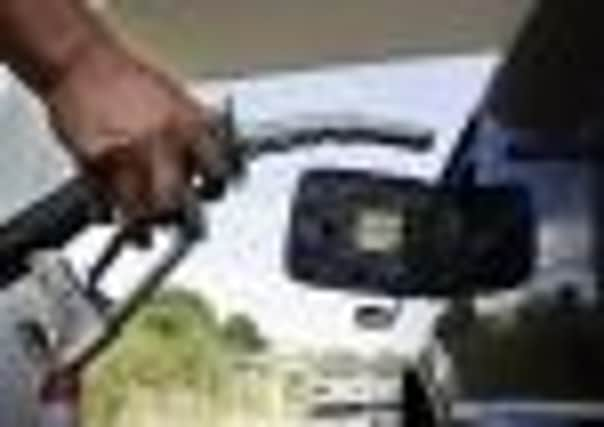Leader: Forecourt frenzy is symptom of our panic button culture


And when Downing Street officials say there would be a meeting of the government’s dramatically-named COBRA national emergencies committee (named after the Cabinet Office Briefing Room A in the bowels of Downing Street) and then denies such a meeting was held, the evident disarray would be enough to sow doubt in the public mind about calls urging them not to panic. Indeed, in the circumstances of a union vote to strike and a Bank Holiday looming, the very plea “Don’t panic!” is enough to send millions scurrying to the petrol stations to panic buy.
So it has already proved, with forecourt managers talking of a surge in petrol buying 45 per cent above normal daily levels. By that measure alone, the government’s handling so far of the tanker drivers’ dispute cannot be said to have been either professional or reassuring.
Advertisement
Hide AdAdvertisement
Hide AdThe key facts of the dispute are these. First, the trade union Unite says the strike ballot is not about pay but about safety standards and terms and conditions. The union says the industry is too “fragmented” and wants a “national forum” which would hold the employers to account over conditions. Second, while union members supplying some 90 per cent of UK forecourts have voted to go on strike, no strike has been called or date fixed. And even if a strike were called, Unite would be required to give seven days’ notice of any walk-outs. All this would hardly seem to merit the “fill your jerry cans” advice from the Cabinet Office minister Francis Maude, still less assure the public of the government’s confidence in the outcome of talks at the conciliation service Acas to avert a stoppage.
However, the public is now highly sensitised to sabre-rattling by unions ahead of a public holiday, and even the merest possibility of a strike with consequent disruption to petrol supplies is enough to trigger a public rush for petrol “just in case”, without waiting for a public exhortation to do so from Mr Maude.
If, as the union suggests, this is not a strike about pay, there would seem to be more room for manoeuvre in negotiations over terms and conditions of work. According to some conspiracy theories, a rush to the garage forecourts is just what the government is seeking to encourage to take the wind out of the sails of the union, rendering a one- or two-day stoppage irrelevant for those many motorists who have already “topped up” at their local garage. It would surely be more constructive if more time was spent seeking to defuse the crisis with union representatives that would take the strike threat off the table. For its part, Unite must recognise the limits to public understanding and patience.
It is crucial that everything adds up
Educationalists call it numeracy. At its most basic it means being able to add up, subtract, multiply and divide, perhaps even work out percentages. Such skills are vital for life, and we have a duty to ensure our children are equipped with them before they reach adulthood.
It follows that it is vital we know how well pupils in our schools are doing in developing these skills, and figures published by the Scottish Government yesterday suggest numeracy teaching in primary schools is satisfactory but falls back in secondaries.
With typical chutzpah, education secretary Michael Russell claimed this was because the controversial Curriculum for Excellence (CfE) had been introduced in primaries but not in secondaries, a conclusion which was instantly dismissed by a respected educationalist and teachers’ union leaders.
Confronted with such a stark divergence of opinion what are parents – whose only interest will be to make sure their children learn those skills they will need throughout their lives – to make of these findings and how can they judge whether the new curriculum is a success? The answer is it is very difficult to make a judgment, partly because the new survey has been conducted with a different methodology from previous tests, making direct comparisons between pre and post-CfE results well nigh impossible.
What we do know from the new tests, is standards slip between primary 4 and primary 7, suggesting the new curriculum is not the panacea Mr Russell claims. More than that is speculation, which is deeply unsatisfactory for something so important.
Fast food levy is about more than dough
Advertisement
Hide AdAdvertisement
Hide AdIt may seem a trivial pursuit to some. But a 20 per cent VAT charge on hot pies, bridies and pasties deals a blow to many bakeries on our high streets. Cornwall was first off the mark with an immediate howl of protest over the Budget levy of VAT on pasties – a highly popular takeaway food which is not only adored by locals but which forms an essential part of the Cornish holiday experience. The tax impost will hit many small bakeries. Scotland is now set to see a similar outcry as the controversy heats up. So far the SNP administration has kept stum over the growing “pie tax” row. But there may well be an opportunity here to forge a nationalist Pastie-Bridie Peoples Alliance, aligning the bridie-defending SNP with Mebyon Kernow, the Cornish home rule party.
The justification for the VAT change is that while outlets specifically selling hot food such as fish and chips have to pay VAT, bakeries, general food stores and supermarkets do not. Millions have already been wiped off the value of shares in Greggs, the nationally popular hot snack chain. Not only does the tax strike at the heart of a local industry such as the pastie which sustains hundreds of jobs, but it is also being seen as another tax charge on lower income households. Hot pies could well see the coalition getting its fingers burned.